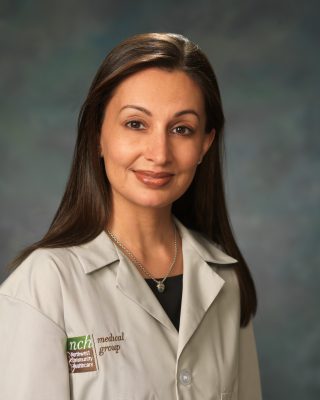Addiction medicine at NCH
August 17, 2021

August 31 is International Overdose Awareness Day and an appropriate occasion to shine a light on addiction services available at NCH.
Unfortunately, addiction problems are everywhere. Addiction ignores age, social economic factors and geographic boundaries. The Northwest suburbs are not excluded.
Shalu Gugnani, M.D. is board-certified in family medicine and is one of only a small group of physicians in the Chicago area trained and board-certified in addiction medicine. She shares the tragic statistic that overdose deaths have increased by 30 percent nationally since the pandemic began.
“We’re seeing an increasing number of patients with opioid use disorder, and young adults with polysubstance use (the use of more than one substance at once). What has been most concerning to me is seeing that almost all patients who come in for treatment of opioid use disorder are testing positive for fentanyl and they are often unaware that the product they used included fentanyl.”
When asked why the increase of cases, Dr. Gugnani shares, “we are living in challenging times for everyone. Living through a pandemic is a new experience for us and can make mental health challenges like isolation, anxiety and loneliness even worse. Some patients find themselves self-medicating, and instead of seeking outpatient treatment they deem might be unsafe, they think they can do it on their own. At the same time, many addiction support services like 12-step meetings have moved from in-person to virtual – which isn’t effective for everyone.
“The past 18 months have presented unique challenges for those struggling with substance-use disorders. This has been a time of increased isolation and stress, and even people with no history of substance-use disorders are turning to alcohol and other drugs to cope. Chronic use of such substances can lead to development of a substance-use disorder, as your body and brain start to crave it. People will often use higher amounts to get the same effect, which is called tolerance. If a person is using moderate to high levels of a substance for an extended period of time, they can also experience withdrawal symptoms as their body essentially needs the substance to feel ok.
“Fortunately, we have treatment options for patients struggling with substance-use disorder including inpatient and outpatient treatments, which may include medications to help reduce the intensity and frequency of cravings. Many patients often enter and maintain a successful recovery if they engage in both the therapeutic and medication treatment options for their use disorder.”
The NCH residential treatment program opened in February of 2016 and has helped many patients stabilize and enter successful recovery programs. Dr. Gugnani and her team started providing outpatient addiction care in 2017, and the clinic has recently expanded in 2020 to include psychiatric and therapeutic services.
NCH offers a variety of resources for patients seeking help: inpatient, outpatient, therapeutic and medical programs. “Treatment varies, depending on the type of substance involved in a patient’s addiction. We have a wide array of approaches and medications,” she emphasizes.
In addition to traditional treatments, holistic programs like yoga, meditation and exercise, which can increase endorphin levels in the brain and give patients an overall greater sense of well-being, are often recommended, Dr. Gugnani says.
NCH Addiction Treatment Services benefit those who need the most supportive treatment environment and they are specifically tailored to each patient’s needs. To learn more visit our website.
To contact NCH Addiction Treatment Services, please call 847-HEALING (847-432-5464).